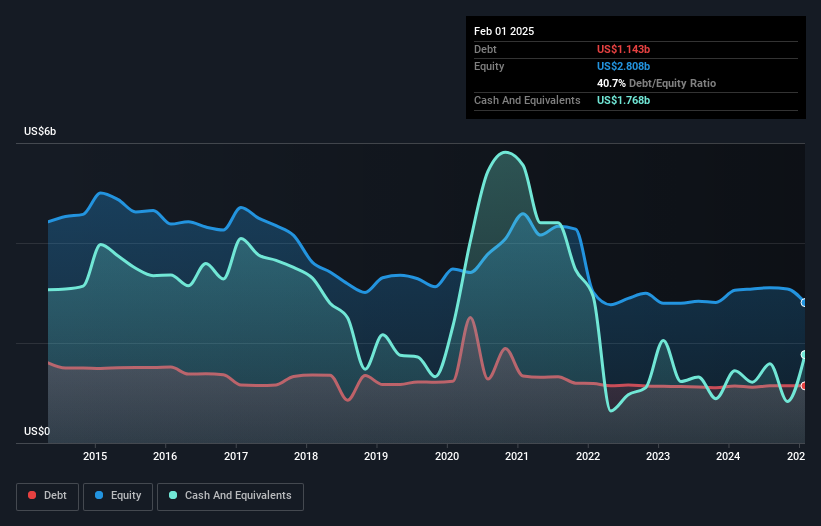- United States
- /
- Specialty Stores
- /
- NYSE:BBY
Here's Why Best Buy (NYSE:BBY) Can Manage Its Debt Responsibly
Warren Buffett famously said, 'Volatility is far from synonymous with risk.' When we think about how risky a company is, we always like to look at its use of debt, since debt overload can lead to ruin. As with many other companies Best Buy Co., Inc. (NYSE:BBY) makes use of debt. But is this debt a concern to shareholders?
When Is Debt A Problem?
Debt is a tool to help businesses grow, but if a business is incapable of paying off its lenders, then it exists at their mercy. Part and parcel of capitalism is the process of 'creative destruction' where failed businesses are mercilessly liquidated by their bankers. While that is not too common, we often do see indebted companies permanently diluting shareholders because lenders force them to raise capital at a distressed price. Having said that, the most common situation is where a company manages its debt reasonably well - and to its own advantage. When we examine debt levels, we first consider both cash and debt levels, together.
What Is Best Buy's Net Debt?
The chart below, which you can click on for greater detail, shows that Best Buy had US$1.14b in debt in February 2025; about the same as the year before. But on the other hand it also has US$1.77b in cash, leading to a US$625.0m net cash position.

How Strong Is Best Buy's Balance Sheet?
Zooming in on the latest balance sheet data, we can see that Best Buy had liabilities of US$8.02b due within 12 months and liabilities of US$3.96b due beyond that. On the other hand, it had cash of US$1.77b and US$1.04b worth of receivables due within a year. So its liabilities total US$9.16b more than the combination of its cash and short-term receivables.
This deficit is considerable relative to its very significant market capitalization of US$13.2b, so it does suggest shareholders should keep an eye on Best Buy's use of debt. This suggests shareholders would be heavily diluted if the company needed to shore up its balance sheet in a hurry. Despite its noteworthy liabilities, Best Buy boasts net cash, so it's fair to say it does not have a heavy debt load!
View our latest analysis for Best Buy
While Best Buy doesn't seem to have gained much on the EBIT line, at least earnings remain stable for now. There's no doubt that we learn most about debt from the balance sheet. But it is future earnings, more than anything, that will determine Best Buy's ability to maintain a healthy balance sheet going forward. So if you're focused on the future you can check out this free report showing analyst profit forecasts .
Finally, a company can only pay off debt with cold hard cash, not accounting profits. Best Buy may have net cash on the balance sheet, but it is still interesting to look at how well the business converts its earnings before interest and tax (EBIT) to free cash flow, because that will influence both its need for, and its capacity to manage debt. During the last three years, Best Buy produced sturdy free cash flow equating to 56% of its EBIT, about what we'd expect. This free cash flow puts the company in a good position to pay down debt, when appropriate.
Summing Up
While Best Buy does have more liabilities than liquid assets, it also has net cash of US$625.0m. So we don't have any problem with Best Buy's use of debt. When analysing debt levels, the balance sheet is the obvious place to start. However, not all investment risk resides within the balance sheet - far from it. These risks can be hard to spot. Every company has them, and we've spotted 2 warning signs for Best Buy you should know about.
At the end of the day, it's often better to focus on companies that are free from net debt. You can access our special list of such companies (all with a track record of profit growth). It's free.
Valuation is complex, but we're here to simplify it.
Discover if Best Buy might be undervalued or overvalued with our detailed analysis, featuring fair value estimates, potential risks, dividends, insider trades, and its financial condition.
Access Free AnalysisHave feedback on this article? Concerned about the content? Get in touch with us directly. Alternatively, email editorial-team (at) simplywallst.com.
This article by Simply Wall St is general in nature. We provide commentary based on historical data and analyst forecasts only using an unbiased methodology and our articles are not intended to be financial advice. It does not constitute a recommendation to buy or sell any stock, and does not take account of your objectives, or your financial situation. We aim to bring you long-term focused analysis driven by fundamental data. Note that our analysis may not factor in the latest price-sensitive company announcements or qualitative material. Simply Wall St has no position in any stocks mentioned.
About NYSE:BBY
Best Buy
Offers technology products and solutions in the United States, Canada, and internationally.
Excellent balance sheet established dividend payer.
Similar Companies
Market Insights
Community Narratives





